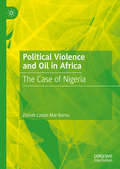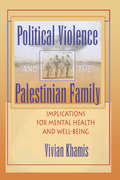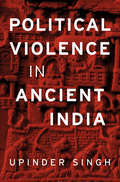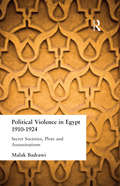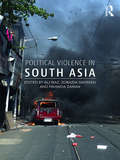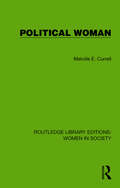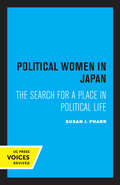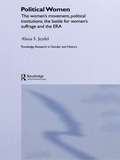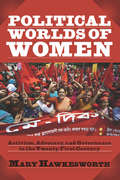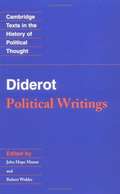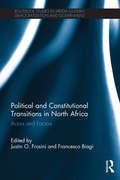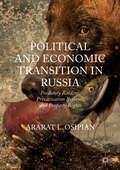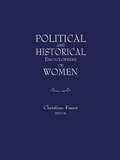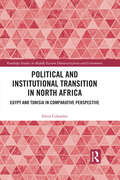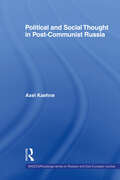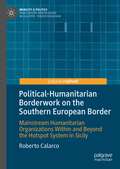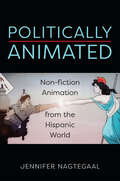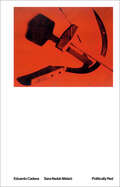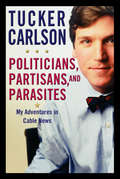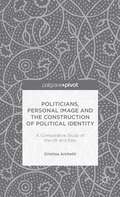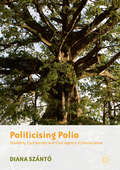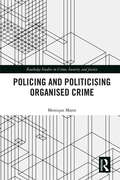- Table View
- List View
Political Violence and Oil in Africa: The Case of Nigeria
by Zainab Ladan Mai-BornuThe book argues that in order to better understand the undercurrents of the Niger Delta conflict, it is imperative to analyse the dynamics of choice in terms of the distinct courses of action taken by the Ogoni and Ijaw. Given the similar structural constraints, the author considers why the Ogoni adopted nonviolent resistance, and the Ijaw violent resistance. This book is divided into seven chapters starting with an introduction to oil and political violence in African conflicts, and includes a synoptic overview of four other resource-rich countries in Africa. Theoretical and conceptual underpinnings of conflict are then presented with the aim of situating the Niger Delta conflicts within the wider conflict literature. Chapter Three concentrates the discussion on the Nigerian Niger Delta, outlining the core issues at the centre of the contestations. The following three chapters offer an in-depth empirical analysis on the interaction between the narratives on nonviolence versus violence, the nature of leadership styles, and the organisation of the Ogoni and Ijaw movements along with a concluding chapter.
Political Violence and the Palestinian Family: Implications for Mental Health and Well-Being
by Vivian KhamisWhat has political occupation done to Palestinian family life in the West Bank, Jerusalem, and the Gaza Strip?A psychological study of family members affected by unrest, Political Violence and the Palestinian Family: Implications for Mental Health and Well-Being examines families living in the midst of the conflict in the Middle East to help mental health professionals, social scientists, counselors, and students in these fields create appropriate intervention methods and provide relevant and effective services. Discussing coping, social support, ideology, and the sociopolitical conditions of Palestinian families, this comprehensive guide is the first book that specifically focuses on Palestinians. Political Violence and the Palestinian Family combines quantitative and qualitative research to clarify the sociological and psychological impacts upon Palestinian family life in the wake of the Intifada (the Palestinian uprising against Israeli occupation). This book depicts the human cost of Israeli occupation on this population and the failure of the Palestinian Authority to ameliorate the effects of violence on this society.Political Violence and the Palestinian Family discusses: political victimization and how it affects families the psychiatric symptomatology of Palestinians the psychological and somatic sequelae of political trauma techniques for successful sessions with Palestinian clients appraisal and coping techniques the values and beliefs of PalestiniansPolitical Violence and the Palestinian Family: Implications for Mental Health and Well-Being will help mental health professionals, social scientists, counselors, and students create appropriate intervention methods and provide relevant and effective services to Palestinian clients.
Political Violence in Ancient India
by Upinder SinghGandhi and Nehru helped create a myth of nonviolence in ancient India that obscures a troubled, complex heritage: a long struggle to reconcile the ethics of nonviolence with the need to use violence to rule. Upinder Singh documents the tension between violence and nonviolence in ancient Indian political thought and practice, 600 BCE to 600 CE.
Political Violence in Egypt 1910-1925: Secret Societies, Plots and Assassinations
by Malak BadrawiThe murder of the Prime Minister, Butrus Ghali, in February 1910, was the first incident of its kind to take place in Egypt for over a century, and it reflected the mood of Egypt's youth at the time. It also set a precedent, as some of the more extreme elements of the population henceforth came to regard assassination as the only way to rid the country of those who were regarded as 'traitors', and as the most potent expression of political dissatisfaction and dissent. This study is an account of the circumstances that led to the violence, and an attempt to understand the mood and motives that provoked it.
Political Violence in South Asia
by Ali Riaz Zobaida Nasreen Fahmida ZamanPolitical violence has remained an integral part of South Asian society for decades. The region has witnessed and continued to encounter violence for achieving political objectives from above and from below. Violence is perpetrated by the state, by non-state actors, and used by the citizens as a form of resistance. Ethnic insurgency, religion-inspired extremism, and ideology-driven hostility are examples of violent acts that have emerged as challenges to the states which have responded with violence in the form of civil war and through violations of human rights disregarding international norms. This book explores various dimensions of political violence in South Asia, namely in Bangladesh, India, Nepal, Pakistan, and Sri Lanka. Each chapter either speaks to an important aspect of the political violence or provides an overall picture of the nature and scope of political violence in the respective country. Political violence is understood in the larger sense of political, that is, above and beyond institutions, and also as an integral part of social relationships where social norms and the role of individual agency play seminal roles. The contributions in this book incorporate both institutional and non-institutional dimensions of political violence. Exploring how everyday life in South Asian states and societies is transformed by the engagement with violence through direct and indirect methods, this book adopts an interdisciplinary framework; diverse methods are employed – from ethnographic readings to more macro level analyses. The phenomenon is explored from historical, sociological, and political perspectives. This book will be useful as a supplementary text in courses on South Asian Studies in general and South Asian Politics in particular.
Political Woman (Routledge Library Editions: Women in Society)
by Melville E. CurrellOriginally published in 1974, Political Woman explains why women had participated so little in the British political elite at the time. To many, the question was familiar and the facts plain. Melville Currell in an objective way analyses and attempts to answer the question, ‘Why so few?’The book begins with a brief survey of women’s political activity before enfranchisement. It continues by tracing the assimilation of women into the various levels of political activism, as ‘the late comers’ to the political scene, and compares them with their immediate predecessors, working class men.The author looks for answers in two areas to the basic question posed in the book. She had conducted empirically based studies of the relatively few women activists, and analysed the more general factors including political and sociological considerations. The women she studied are those who had ever been elected to Parliament, and the aspirants, the ‘volunteers’ i.e. the Prospective Parliamentary Candidates. She looked not only at their background characteristics and career patterns, but at how they perceived the political role of women.In addition, she evaluated factors which may have been regarded as militating, or mediating women’s entry into the political elite, like woman’s changing role in society, her status in the educational and occupational sectors, the political socialization process as it affected women and girls, and the incidence of two factors which may be termed ‘male equivalence’, and ‘the politicized family’. Candidate selection in the parties is also briefly considered.Two chapters place women’s political activism in Britain in a wider framework. In terms of a wider regional context, the comparative political role of women is outlined, an outline which includes material from Western Europe and from the Communist sector. In the search for a wider definition of ‘political’, a chapter is devoted to the rise and relevance of the Women’s Liberation Movement.
Political Women in Japan: The Search for a Place in Political Life
by Susan J. PharrDrawing on interviews with one hundred young Japanese women engaged in a spectrum of voluntary political groups, Susan J. Pharr explores how politically active women overcome the constraints that bar or limit the political participation of the average woman. The book treats political volunteers as agents of social change in a process of role redefinition by which prevailing concepts of women's roles gradually adjust to accommodate political behavior. Tracing developments that led to the grant of suffrage and other political rights to women during the Allied occupation, Pharr sets the stage for an analysis of that process as it unfolds in the experience of individual women. She uses women's images of self and society and issues of political and gender role socialization, career and life expectations, and political role and participation to develop a three-fold typology for looking at political women in Japan. She examines both the satisfactions of political volunteerism—from the exhilaration of addressing a crowd from a sound truck to the pleasure of speaking "men's language"—and the psychological and social costs associated with it. This title is part of UC Press's Voices Revived program, which commemorates University of California Press’s mission to seek out and cultivate the brightest minds and give them voice, reach, and impact. Drawing on a backlist dating to 1893, Voices Revived makes high-quality, peer-reviewed scholarship accessible once again using print-on-demand technology. This title was originally published in 1981.
Political Women: The Women's Movement, Political Institutions, the Battle for Women's Suffrage and the ERA (Routledge Research in Gender and History)
by Alana JeydelUnder what conditions are political elites responsive to social movements, and when do social movements gain access to political elites? This book explores this question with regard to the women's movement in the US, asking under what conditions are Congress and the presidency responsive to the women's movement, and when will the women's movement gain access to Congress and the presidency?The book systematically compares the relation between political leaders and each of the three waves of the women's movement, 1848-1889, 1890-1928, and 1960-1985, in light of the political dynamics that each wave faced. The author utilizes perspectives and methods from the fields of Political Science, Sociology, and History to illustrate the ways in which changing political dynamics impacted the battle for both women's suffrage and the Equal Rights Amendment.A significant addition to the study of women's history and American studies, Political Women illlustrates the important roles that political leaders played in the battle for women's suffrage and the ERA and demonstrates the political savvy among women suffrage activists who recognized the institutional barriers present in the US political system and fought to overcome them.
Political Worlds of Women
by Mary HawkesworthIn this work for students and scholars in women's studies and gender politics, Hawkesworth (political science, women's and gender studies, Rutgers University) explores women's work in official institutions of state and in social movements. By taking a global approach to the study of women and politics, the book addresses dimensions of politics seldom considered in mainstream accounts, while also challenging popular views about politics that are derived from men's political experiences. In a break from traditional methods in political science, the author draws on feminist scholarship, comparative politics, and international relations. Early chapters define the politics of exclusion and look at how modern states sustain hierarchies among citizens. The rest of the book traces the ways in which women have mobilized to transform structures of oppression. The book is illustrated with contemporary political posters and b&w photos. Annotation ©2012 Book News, Inc. , Portland, OR (booknews. com)
Political Worlds of Women
by Mary HawkesworthPolitical Worlds of Women provides a comprehensive overview of women's political activism, comparing formal and informal channels of power from official institutions of state to grassroots mobilizations and Internet campaigns. Illuminating the politics of identity enmeshed in local, national, and global gender orders, this book explores women's creation of new political spaces and innovative political strategies to secure full citizenship and equal access to political power. Incorporating case studies from Africa, Asia, Europe, and the Americas, Mary Hawkesworth analyzes critical issues such as immigration and citizenship, the politics of representation, sexual regulation, and gender mainstreaming in order to examine how women mobilize in this era of globalization. Political Worlds of Women deepens understandings of national and global citizenship and presents the formidable challenges facing racial and gender justice in the contemporary world. It is an essential resource for students and scholars of women's studies and gender politics.
Political Worlds of Women
by Mary HawkesworthPolitical Worlds of Women provides a comprehensive overview of women’s political activism, comparing formal and informal channels of power from official institutions of state to grassroots mobilizations and Internet campaigns. Illuminating the politics of identity enmeshed in local, national, and global gender orders, this book explores women’s creation of new political spaces and innovative political strategies to secure full citizenship and equal access to political power. Incorporating case studies from Africa, Asia, Europe, and the Americas, Mary Hawkesworth analyzes critical issues such as immigration and citizenship, the politics of representation, sexual regulation, and gender mainstreaming in order to examine how women mobilize in this era of globalization. Political Worlds of Women deepens understandings of national and global citizenship and presents the formidable challenges facing racial and gender justice in the contemporary world. It is an essential resource for students and scholars of women’s studies and gender politics.
Political Writings
by Denis DiderotThis volume contains the most important of Diderot's articles for the Encyclopedie, a substantial number of his contributions to the Histoire, the complete texts of his Supplement au Voyage de Bougainville, one of his most visionary works, and his Observations sur le Nakaz, a precise and detailed political work translated here into English for the first time. The editors' introduction sets these works in their context and shows the underlying coherence of Diderot's thought. A chronology of events and a bibliography are included as further aids to the reader.
Political and Constitutional Transitions in North Africa: Actors and Factors (Routledge Studies in Middle Eastern Democratization and Government)
by Justin Frosini Francesco BiagiThe transformations which are taking place in the Arab world are dynamic processes characterised by a number of variables that one can refer to as actors and factors. <P><P>The implications of the Arab uprisings are important for the world at large; the Arab world’s successes, and failures, at this crucial moment may well serve as a model for other nations. Political and Constitutional Transitions in North Africa focuses on five Northern African countries- Tunisia, Egypt, Morocco, Libya and Algeria- examining specific institutions and actors participating in the political upheavals in North Africa since 2011, and placing them in a comparative perspective in order to better understand the processes at work. This book addresses issues pertinent to North African and Middle Eastern Studies, comparative constitutional law, political science and transitional studies and it contains contributions by experts in all these fields. <P><P>Providing a significant contribution to the understanding of events that followed the immolation of Mohamed Bouazizi in Tunisia, this book is a valuable contribution to North African Studies, Middle Eastern Studies, Comparative Constitutional Law and Transitional Studies.
Political and Economic Transition in Russia: Predatory Raiding, Privatization Reforms, and Property Rights
by Ararat L. OsipianThis book analyzes privatization reforms, property rights, and raiders in post-Soviet Russia. The author surveys the existing literature in the context of predatory raiding in Russia and introduces the notion and concept of this phenomena; he suggests that the study may serve as an explanatory model for corporate, property, and land raiding in Russia. Building on previous scholarship, this monograph conceptualizes the predatory character of corporate hostile takeovers in Russia and links it with the coercive nature of the ruling authoritarian regime. This project will appeal to scholars, graduate students, and researchers in Russian and Post-Soviet politics, capitalism, corruption, and property rights.
Political and Historical Encyclopedia of Women
by Christine FauréFirst Published in 2003. Routledge is an imprint of Taylor & Francis, an informa company.
Political and Institutional Transition in North Africa: Egypt and Tunisia in Comparative Perspective (Routledge Studies in Middle Eastern Democratization and Government)
by Silvia ColomboThe year 2011 will go down in history as a turning point for the Arab world. The popular unrest that swept across the region and led to the toppling of the Ben Ali, Mubarak, and Qaddhafi regimes in Tunisia, Egypt, and Libya has fundamentally altered the social, economic, and political outlooks of these countries and the region as a whole. This book assesses the transition processes unleashed by the uprisings that took place in Egypt and Tunisia in 2011. The wave of unrest and popular mobilisation that swept through these countries is treated as the point of departure of long and complex processes of change, manipulation, restructuring, and entrenchment of the institutional structures and logics that defined politics. The book explores the constitutive elements of institutional development, namely processes of constitution making, electoral politics, the changing status and power of the judiciary, and the interplay between the civilian and the military apparatuses in Egypt and Tunisia. It also considers the extent to which these two countries have become more democratic, as a result of their institutions being more legitimate, accountable, and responsive, at the beginning of 2014 and from a comparative perspective. The impact of temporal factors in shaping transition paths is highlighted throughout the book. The book provides a comprehensive assessment of political and institutional transition processes in two key countries in North Africa and its conclusions shed light on similar processes that have taken place throughout the region since 2011. It will be a valuable resource for anyone studying Middle Eastern and North African politics, area studies, comparative institutional development and democratisation.
Political and Legal Transformations of an Indonesian Polity
by Franz von Benda-Beckmann Keebet von Benda-BeckmannPolitical and Legal Transformations of an Indonesian Polity is a long-term study of the historical transformations of the Minangkabau polity of nagari, property relations and the ever-changing dynamic relationships between Minangkabau matrilineal adat law, Islamic law and state law. While the focus is on the period since the fall of President Suharto in 1998, the book charts a long history of political and legal transformations before and after Indonesia's independence, in which the continuities are as notable as the changes. It also throws light on the transnational processes through which legal and political ideas spread and acquire new meanings. The multi-temporal historical approach adopted is also relevant to the more general discussions of the relationship between anthropology and history, the creation of customary law, identity construction, and the anthropology of colonialism.
Political and Social Thought in Post-Communist Russia (BASEES/Routledge Series on Russian and East European Studies #Vol. 40)
by Axel KaehneThis is the first comprehensive study of Russian political and social thought in the post-Communist era. The book portrays and critically examines the conceptual and theoretical attempts by Russian scholars and political thinkers to make sense of the challenges of post-communism and the trials of economic, political and social transformation. It brings together the various strands of political thought that have been formulated in the wake of the collapsed communist doctrine. It engages constructively with the numerous attempts by Russian political theorists and social scientists to articulate a coherent model of liberal democracy in their country. The book investigates critical, as well as favourable voices, in the Russian debate on liberal democracy, a debate often marked by eclecticism and, at times, little conceptual discipline. As such, the book will be of great interest both to Russian specialists, and to all those interested in political and social thought more widely.
Political-Humanitarian Borderwork on the Southern European Border: Mainstream Humanitarian Organizations Within and Beyond the Hotspot System in Sicily (Mobility & Politics)
by Roberto CalarcoThis book focuses on the role mainstream humanitarian organizations have in the functioning of the border management system on the southern European border (i.e. Italy). In particular, the author analyses the mainstream humanitarian organizations and NGOs (i.e. Red Cross, the UNHCR, Medici per I Diritti Umani – MEDU, Terre des Hommes and Oxfam) and their role within and beyond the implementation of the so-called ‘hotspot approach’ in Sicily. This work suggests that a vision of humanitarian action as just anti-political and complicit with migration control can be questioned. This book suggests that a) mainstream organizations have been able to politicize their positioning and actions vis-à-vis authorities when migration policies have been tightened; b) mainstream organizations’ political borderwork has helped to promote incremental change in the status quo rather than a radical one. Finally, this book suggests that the discourses and practices of mainstream and grassroots actors seems to be characterized by similar contradictions.
Politically Animated: Non-fiction Animation from the Hispanic World (Toronto Iberic)
by Jennifer NagtegaalPolitically Animated studies the convergence of animation and actuality within films, television series, and digital shorts from across the Spanish-speaking world. It interrogates the many ways in which animation as a stylistic tool and storytelling device participates in political projects underpinning an array of non-fiction works. The case studies in the book cover a diverse geographical scope, including Spain, Argentina, Colombia, and Mexico. They critically analyse different works such as feature-length animated documentary films, a work of animated journalism, a short animated essay, and micro-short episodes from a televised animated documentary series. Jennifer Nagtegaal employs the term "politically animated" in reference to the ideological implications of choosing specific techniques and styles of animation within certain socio-historical and cultural contexts. Nagtegaal illuminates the creative union of animated documentary and the comics medium currently being exploited by Spanish and Latin American cartoonists and filmmakers alike. By paying particular attention to cultural production beyond the big screen, Politically Animated continues to stretch the bounds of animated documentary scholarship.
Politically Red
by Eduardo Cadava Sara Nadal-MelsioHow reading and writing are collective acts of political pedagogy, and why the struggle for change must begin at the level of the sentence.&“Reading is class struggle,&” writes Bertolt Brecht. Politically Red contextualizes contemporary demands for social and racial justice by exploring the shifting relations between politics and literacy. Through a series of creative readings of Karl Marx, Rosa Luxemburg, Walter Benjamin, W. E. B. Du Bois, Fredric Jameson, and others, it casts light on history as an accumulation of violence and, in doing so, suggests that it can become a crucial resource for confronting the present insurgence of inequality, racism, and fascism. Reading between the lines, as it were, and even behind them, Cadava and Nadal-Melsió engage in an inventive mode of activist writing to argue that reading and writing are never solitary tasks, but always collaborative and collective, and able to revitalize our shared political imagination. Drawing on what they call a &“red common-wealth&”—an archive of vast resources for doing political work and, in particular, anti-racist work—they demonstrate that sentences, as dynamic repositories of social relations, are historical and political events.
Politicians, Partisans, and Parasites: My Adventures in Cable News
by Tucker CarlsonPolitical pundit Tucker Carlson cracks sharp and wise on all things Wash- ington with the acerbic wit and razor-sharp insight that have made him a beloved conservative commentator. Proclaimed by NewYork magazine as the pundit most likely to succeed in these Bushian years, Tucker Carlson anchors the right side of CNN's Crossfire aisle. An unabashed beltway insider whose profile is unmatched, Carlson stands ready to pounce on anyone and everyone who dares enter the political fray. Now, he applies his deft and amusing perspective to the goings-on in our nation's capital. Whether it's the towel-snapping prowess of the President or the dumbfounding exploits of his predecessor, there is no sacred ground. A wild and informative ride behind the scenes of a cable newsman, Carlson's debut covers his beat with equal parts hilarity and insight in a jocular review that both exposes and defends the absurdity that underlies the world of politics.
Politicians, Personal Image and the Construction of Political Identity: A Comparative Study of the UK and Italy
by Cristina ArchettiIs the media obsession with image leading to a degeneration of politics? Are politicians more concerned with their appearances than with policy substance? Through the evidence provided by over 50 interviews with politicians across the UK and Italy - local councillors, MPs and MEPs - this book provides a very different picture of the world of politics than the one we often cynically imagine. By relying on extensive excerpts from frank and colorful conversations with the interviewees, the analysis develops a new multidisciplinary model to understand the 'mediatization' of politics and the way the personal image of elected representatives is constructed in the age of interconnectedness.
Politicising Polio: Disability, Civil Society and Civic Agency in Sierra Leone
by Diana SzántóThis book examines disability in post-war Sierra Leone. Its protagonists are polio-disabled people living in the nation’s capital of Freetown, organizing themselves as best as they can in a state without welfare. There is little concrete support for people with disabilities in a country where the government is struggling with the competing requirements of the international community, demanding - in exchange for its support - good standards of democracy and the maintenance of a free market economy. To what extent is the Human Rights framework of the disability movement effective in protecting the polio-disabled and what are the limitations of this framework? Diana Szántó’s detailed ethnography reveals, through many real-life examples, the vulnerability of disabled people living in the intersections of poverty, informality and disability activism. At the same time, it also tells about the many ways the polio-disabled community is transforming vulnerability into strength.
Politicising and Policing Organised Crime (Routledge Studies in Crime, Security and Justice)
by Monique MannThe concept of ‘organised crime’ is constructed and mobilised by a milieu of complex factors and discourses including a politics of law and order, and international insecurity, combined with the vested interests and priorities of scholars, politicians, government officials, and policing authorities. This book challenges existing assumptions and accepted understandings of organised crime, and explores the ways in which it is amplified and reconstructed for political purposes. This book critiques how the constitution of the ‘organised crime problem’ in academic and political discourse provides the conditions necessary for the development of an extensive and international architecture of law, policing, surveillance and intelligence. It examines emerging challenges and future directions including the impact of technology on new problems, and for transnational policing, such as the ease with which the Internet enables crime to be committed across borders, and for electronic communications to be protected with strong encryption hampering interception. No other text presents an integrated and comprehensive study of both the politicisation and policing of organised crime, while questioning the outcomes for society at large. Drawing on international fieldwork and interviews with senior national and supranational policing personnel, this book compares and contrasts various narratives on organised crime. It will be of interest to students and researchers engaged in studies of criminology, criminal justice, organised crime, policing, and law.
